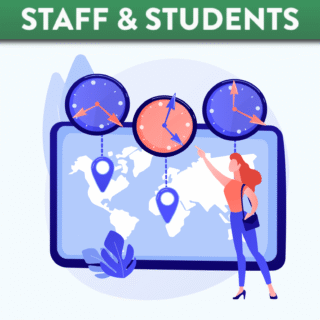
Digital First Aid - FAQs

Have you a question about any aspect of digital skills?
Here you can find the most common questions that students want to know about development of digital skills and learning in a digital environment. The FAQs are categorised into different sections to make it easier for you to find the answer that you are looking for, or you can just simply browse through them to improve your knowledge and get some tips and practical advice about digital skills.
Digital Skills Development
These questions are about how you can gauge and improve your digital skills. They also explore the use of different tools and apps in learning.
In the Digital Skills Discovery Hub, all students can find a range of resources to help them improve their digital skills. This includes everything from infographics and podcasts that we have created to curated courses that you can sign up to. These resources are all organised around six different digital capabilities of development. You can find out more about each of these within this Hub, created especially for you as a student.
Just navigate yourself from here back to the home or landing page.
You can use the Jisc Discovery Tool to start assessing or exploring your digital skills. This is an online tool that Queen’s have subscribed to, so all Queen’s students and staff can freely access this service.
By completing a short questionnaire that asks you about your digital attitudes and skills, you will receive a personal visualisation report on 15 areas of digital capability. It takes around 15 minutes to do and you can re-take it as often as you want. It will allow you to identify your current digital strengths and explore new areas of development so why not get started today?
Additionally, there are also two new question sets for you to reflect on - including Generative AI and Digital Skills, and Employability. A great opportunity for you to not only think about the digital skills needed for right now but also for the future!
If you have strong general digital skills, taking the Jisc Discovery Tool will allow you to highlight more niche, specific areas of digital capability that you may have never considered before. For example, you may be good at coding and creating digital content but you may struggle with being information or data literate. You may be able to easily adapt to new apps and use new technology to solve problems but not know how to manage your online identity.
Even if you are confident in digital skills, we would recommend taking the Discovery Tool to identify your strengths and areas for improvement. There are suggested resources to explore after you have completed the tool or if you want to learn more you can pick a course from our curation in the Hub area.
Password management is a very important part of your online learning experience and it is equally as important in your private life. As a student, it is essential that you keep your accounts and devices safe, private and secure.
Here is Queen's advice on password guidance, security, and protecting devices.
It is advisable to read this information carefully and return to it regularly for any updates on security advice.
There is an Introduction to SPSS workshop that is available to undertake.
You can also sign up and check out this useful SPSS statistics resource.
These will provide a range of relevant materials and guides to help you to carry out different analyses that you may need to as part of your research.
Other sources of advice available include:
- The Queen's Library - ask at the information desk
- Graduate School
- Your own School website for information
In a survey of digital experiences, we regularly ask students at Queen's to identify what apps and tools that they like to learn with. A great diversity is always found. For example in one year over 170 different types were listed. The top 3 apps and tools that students often use are YouTube, Canvas and Quizlet (which is a flashcard app to help students study).
As a direct result of this survey, we developed a Digital Tool Study Guide which provides a list of suggested tools and apps for different aspects of your study - such as revision, presentation and planning.
Tip: When thinking about what tools to use, always remember to think about your digital wellbeing and use what works for you - remember there are apps to help you unwind from study too!
Being an Online Learner
These questions are about different aspects of being an online learner in digital environments.
Yes, we have a whole section – Digital Communication, Collaboration, and Participation – that is dedicated to this. Communication is vital to an enriching and successful learning experience. Take some time to explore this section and check out our handy infographic outlining the Queen's Digital Etiquette, which every student learning online should know about.
You could also read the article Engaging in Online Discussions from our blog section that provides students with practical tips when engaging in an online environment. It provides some useful advice and showcases the Queen's Digital Etiquette mentioned earlier.
We have created a short guide on the benefits of online learning.
After viewing it, why not take our 10 step challenge of being an online learner. We use some of the resources created in the hub to provide you with some challenges and we have created other new resources especially for the challenge itself. How many challenges can you do?
Here is a short video about the 10 step challenge to explain more.
Download the 10 Step Challenge Transcript
Digital Identity is important – how we behave online can shape the first impressions we make on people, in academia, the workplace and general networking. Being a good digital citizen also involves keeping ourselves, our data and others safe.
To learn more about this, visit the Digital Identity and Wellbeing section of the Hub. We have compiled resources that will help you to understand digital citizenship and to manage your digital identity.
You are right to consider the amount of time you spend online and how this impacts on your health. Every student should be mindful of this, especially as technology is central to learning, work and everyday life.
Explore the information and resources provided in our Digital Identity and Wellbeing section. This will help bring you up-to-date so you are more knowledgeable about this area of your health and will provide practical tips and resources so you can start implementing change to improve your digital wellbeing.
We have resources specifically for mature students returning to education. These will help you to understand how technology plays a role in your learning and how to grow your confidence in using it.
The capability of ICT Proficiency and Productivity would be a good place to start. This capability is all about building up your knowledge and skills, while also understanding how to make the best use of your time, staying focused and organised while learning and working digitally.
If you complete the Digital Discovery Tool it will also give you a good overview of each digital capability area. It means you can focus on any gaps but also gain some idea where your strengths lie. You can take the tool as often as you like which will be helpful in charting your progression.
Students might rightly want to know how their data is collected. The University is very careful with all student data and adhere strictly to the GDPR guidelines.
Find out more information about data protection and policies at Queen's.
Creating Content
Below are some Frequently Asked Questions relating to digital creation.
Free to use images are in the public domain. This means that there are no copyright issues so you can use them in your university work such as creating presentations and posters.
Some suggestions of websites to visit include:
Some of these even include free videos and vector images you could use for animations. Even though this range of media is free to use it is always a good idea to reference the content where and when you can.
You can also take your own photos and record your own videos and use them!
Copyright is a very important aspect of creating digital content. It is against the law to use images, photos, videos and other media unless you have permission to do so.
Copyright can be quite complicated to learn and remember but here is a video that we have created to keep you right.
Download the Learn about Copyright Transcript.
We have some detailed poster guides to help you to do this. These can be found in this Digital Creation Toolkit, a resource created especially for students at Queen's. Poster guides can be found in the 'Creating Digital Content' column. There is loads more to explore while you are there.
We have a brief video guide on how to create an infographic in Canva.
Download the Creating an infographic using Canva Transcript.
Other tools worth trying include Piktochart and Microsoft Sway.
We have a list of tools in our Digital Study Tool Guide that you can browse. You can also look at our Digital Creation Toolkit section.
One suggestion that is free and easy to use is Adobe Express (formally Adobe Spark. There is the Adobe Express Starter Plan, both the website (express.adobe.com) and the iOS/Andriod app. They are free so why not start now and look at what you can create individually and together.
There are a lot of tools and software that you can use for learning - some are free and some will need a subscription. It is good to check this out before you decide which tool to use.
We have compiled a list of suggested tools for you in the Digital Study Tool Guide which may help in different aspects of your study.
Also, if you find something that you think other students would find useful why not contact us and let us know. By sharing what you find useful we all learn! You can contact us by email digitalinsights@qub.ac.uk

